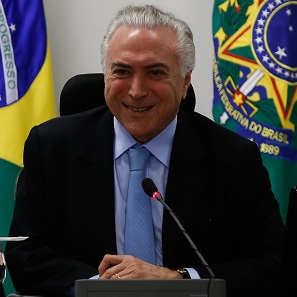by Annika Backe
September 21, 2017 – Three months ago, CoinsWeekly reported on the end of the Belgian Mint, effective January 1, 2018. At that time, it was the last closure or privatization of a mint. In 2016, the Royal Dutch Mint was sold, and the Royal Danish Mint was closed down. In the last two years, a development seems to be accelerating which markets experts have expected for quite some time now. There is simply too little work to be done for the many technologically upgraded mints of the world. A process of crowding out is imminent.
Now Brazil is affected. The President of Brazil, Michael Temer, wants to sell the country’s Casa de Moeda to private operators.
Michel Temer, President of Brazil since August 2016. Photo: Michel Temer – 06/07/2017 – Transmissao de Cargo de Presidente da República / Wikimedia Commons / CC BY 2.0.
The privatization project
Since August 31, 2016, liberal-conservative Temer has been President of Brazil. His predecessor, Dilma Roussef, had been removed from office after impeachment proceedings for breaking budgetary laws. Since 2014, the country has struggled against an economic crisis. It was further exacerbated when Brazil was left with debts amounting to almost $36 million after the 2016 Olympic Summer Games in Rio de Janeiro.
In November 2016, President Temer has started his countermeasure, a sell-off program involving almost 60 state assets. One of these is the national Casa Moeda do Brasil located in Rio de Janeiro. Founded by the Portuguese King in 1694, the Mint, which is operating under the control of the Ministry of Finance, produced both the country’s currency and the identity cards of the Brazilian citizens.
Critical voices
According to reports in Brazilian media, it is particularly this aspect that makes the opponents criticize the privatization project. One of these is Aluizio Junior of the Union of Employees of the Mint of Brazil. He says: “The Mint plays a strategic role in the defense of national sovereignty. It is a high risk for society to have the data of all Brazilian citizens available for a private initiative.”
Government officials, however, argue that more and more transactions are paid cashless, and that the Mint had only produced some very few identity cards recently. Aluizio Junior considers this a bogus argument in that the government had suspended the production of passports in order to justify a sale of the Mint on the grounds of the low figures.
More information on the sale of the Mint can be found in Brasil de Fato.
The Brazilian politicians should have a good look at what happened to the German Federal Printing Office. It had been privatized, only to be bought back at a high price after it was ultimately decided to not leave the passport data of the German citizens to a private company.
Further details about this are of course available in CoinsWeekly.
If you want to learn more about the privatization of mints: On February 2, 2017, we have published an entire issue of CoinsWeekly on this problem. It deals with both successful and unsuccessful privatizations.
To read the CoinsWeekly report on the closure of the Belgian Mint, please click here.
To visit the Casa de Moeda homepage, click here.
More on the situation of Brazil after the Olympic Games can be read in The Guardian.





